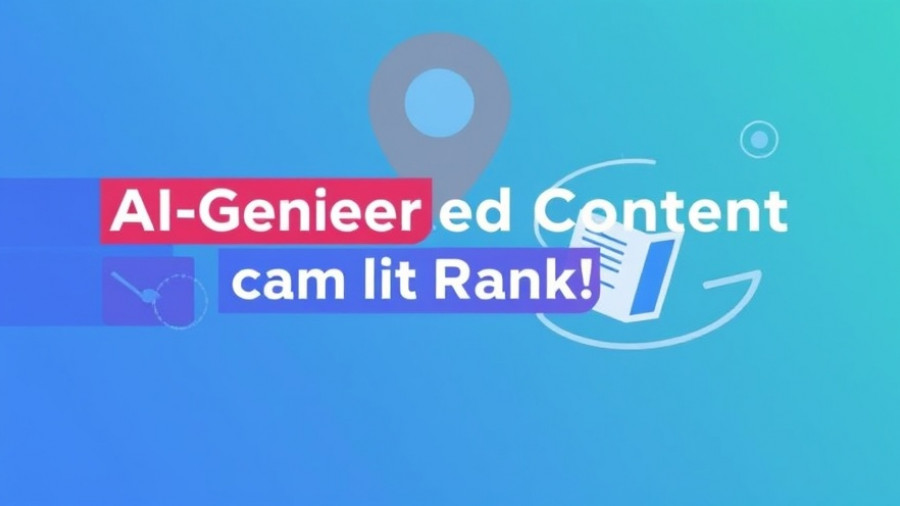
Is Your AI Content Ready for Ranking?
AI-generated content has emerged as a transformative force in marketing, offering businesses unprecedented speed and scalability in creating material. However, many small and medium-sized business owners are left questioning: Can AI-generated content truly rank in search engines like Google? The answer is yes, but it comes with important qualifications.
The Technology Behind AI Generation
AI-generated content primarily involves the use of large language models (LLMs) such as ChatGPT or Claude. These tools predict text based on huge datasets, effectively generating human-like responses to prompts. It’s important to understand that the effectiveness of these models hinges on the specificity and clarity of user inputs. Empower your AI with a detailed prompt, and it generates something far more valuable compared to a vague inquiry.
Quality Over Quantity: The Core Message
While AI can rapidly churn out content, Google remains vigilant against low-quality submissions. According to Google’s guidelines, content generated by AI isn’t inherently harmful as long as it’s high-quality and original. In April 2024, Google reported a substantial decline (around 45%) in low-quality content following their core algorithm update. Therefore, businesses that rely solely on AI for content creation, without human oversight, may see diminishing returns.
Human Input: The Missing Ingredient
Integrating human editing and oversight into AI-generated content significantly impacts its ranking ability. A recent survey by Semrush revealed that 64% of marketers believe AI-generated content often performs equivalently or better than purely human-generated efforts. Nonetheless, without human intervention for fact-checking and alignment with brand voice, AI content may fall short.
Expert Tips for Optimizing AI-Generated Content
1. Understand Your Target Audience: Tailoring content for specific demographics significantly boosts engagement. Utilize data analysis to uncover potential pain points and trends.
2. Incorporate Keywords Naturally: While AI can aid in keyword identification, ensure your content flows naturally and the keywords used fit seamlessly within the text. Tools like those offered in Salesforce’s AI for SEO guide can further aid in this process.
3. Focus on Original Research: As AI content saturates the market, distinguishing your offerings through original insights and research will captivate both search engines and your audience.
4. Diversify Traffic Sources: Relying on Google alone can be risky due to changing algorithms and search patterns. Utilize social media, newsletters, and other platforms to drive traffic effectively.
Coping with SEO's Future Landscape
With AI technologies on the rise, the implications for SEO are profound. A study revealed that as many as 8% of U.S. respondents are now using AI language models as their primary search engine, evidencing a slow but steady pivot from traditional search engines like Google. In 2025 and beyond, businesses must adapt to this shift, evolving from purely keyword-focused strategies to comprehensive topic understanding and audience engagement.
Conclusion: The Path Forward
As an owner of a small or medium-sized business, it’s vital to embrace the potential of AI while acknowledging its limitations. Fostering a balance between AI-driven efficiency and meticulous human oversight can effectively elevate your content, ensuring it resonates with search engines and audiences alike.
Explore more about leveraging AI tools in your marketing strategy and grow your business efficiently!
 Add Row
Add Row  Add
Add 



Write A Comment